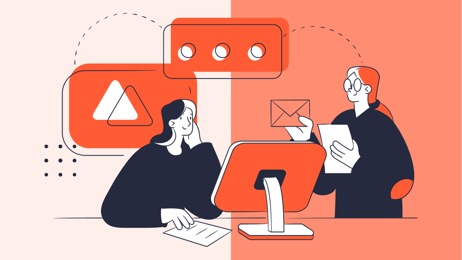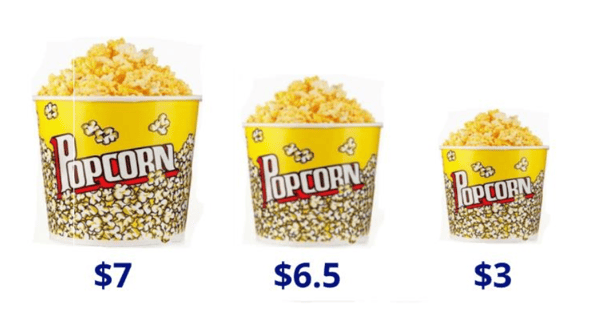If you're in the battle for the lowest price, you're going to lose.
It's an undeniable race to the bottom. There'll always be a competitor able to challenge your price. And when that happens, how much are you willing to reduce the profit margins before your company starts to suffer?
Instead, wouldn't it be great to charge more for what you offer? Not because you want to cheat people out of money, but because you're providing a solution to their problem that's specific and therefore infinitely more valuable to them.
Dropping prices doesn't have to be (and shouldn't be) your approach. If you can give customers something to rally behind, like the traits that separate you from the competition, you can increase your sales and brand loyalty, without sacrificing revenue.
Why You Need to Harness Your Unique Value and Not a Price Point
First things first: Price only matters when nothing else matters.
That sentence is loaded with power for your brand's pricing strategy. Think about it like this:
Last Thanksgiving, we had relatives visiting. As the food was prepared, my wife realized we hadn't bought everything we needed, and since my culinary skills are limited anyway, I was sent to the store.
Now, on this list was cranberry sauce. For the life of me, I've never seen someone at one of our Thanksgiving meals actually eat it. Still, it's always featured on its own small plate in the middle of the table, until it's put in Tupperware and forgotten at the back of the fridge.
So, you can understand that when I got to the aisle and looked at all my options, I was quick to grab the cheapest can on the shelf. It didn't matter what I bought. The sauce was a decoration more than anything.
A few days prior that, when we'd done our actual shopping for the holiday, my relatives nearly demanded we get a Butterball turkey. It was pricier than the generic brand, but it's what their mother had made as they grew up. The bird was tied to emotions that mattered to them, driving the purchase.
So even though we paid over 50 cents a pound more for that turkey, our relatives were satisfied with their purchase because it filled a larger need than the cranberry sauce.
Price only matters when nothing else matters.
If you can adopt this way of thinking, you'll find your customers are willing to pay more for your product, and potentially even cover the difference of mass marketing with a cheaper price.
Product Positioning and The Price Correlation
Your price is attached to how you position your product and it's your unique value that decides which way you can run with it.
For example, no one goes to McDonald's for healthy eating. They eat there because it's cheap and fast. But if you're a restaurateur, you can focus on the health aspects of your cuisine, attracting customers who care about their wellness and are therefore willing to pay more.
Similarly, if you own a flower shop, you can highlight the variety you offer, enticing those who appreciate having more options.
How you position your brand depends on the niche and the needs of your audience, but if you can identify the reason customers are coming to your brand, your price point becomes more flexible, giving you the ability to adjust as necessary.
Set the Value, Not Price
While it would be great to keep raising the price, there are limits to this technique. First, there's only so much you can put into a product or service before you need to start charging more, and second, there's only so much a customer will be willing to pay for a solution.
So rather than determining an ambiguous price point, if you can decide how much value to provide for each product, you can base prices on what customers actually need. Many service company's do this by creating tiers. As the features increase, so does the price, allowing customers to pick what suits them best.
If customers aren't buying your product, one issue could be the amount of value you're providing in the solution. People are more likely to make a purchase if they feel like they're getting the better end of the deal, whether it's real or how they perceive it. Through trial and error, as well as surveys and reviews, you can find the sweet spot for the value to price ratio within your industry.
The Decoy Effect
Because we, as consumers, want to believe we're getting plenty of value with our purchases, our minds can be tricked by simple things like the Decoy Effect.
Dan Ariely wrote about this effect in his book Predictably Irrational. Ariely had found a subscription page for the Economist that had three options. The first was for a digital offer, the second for a print offer, and the last included both. The price of the last two was the same. But, even though the print offer was less valuable on its own, it set the coupled option up as more valuable.
He repeated this process with his students at MIT and found the third option was selected far more than the others.
If the price was all that mattered, customers would have overwhelmingly selected the print offer. But, since the Economist was able to position its product as having more value, it was able to increase the price with it.
Your Growth Depends on the Value You Provide
To prove you need to avoid the battle for reducing your cost, here's some simple math. Say your brand needs to make $1,000 on a product to stay afloat. You could sell to 10 customers at $100, five for $200, or any variation that meets the goal, right?
Well, now let's say you have competition. The other guy can sell for cheaper and still maintain a profit, and since you both offer the same item, people are flocking to them.
But, if you position your brand as having something the competition doesn't, you can pull some of those customers back. If you have the answer to their specific problem, they'll be willing to pay more than the general solution your competition offers. So now, even though you may lose some of your audience to another company, the odds that you'll keep your current customers is higher.
And for the best part, because you have fewer customers you need to please, you can really focus on delivering what they need. You can be the answer they've been looking for, which in turn, means they'll advocate on your behalf, increasing your customers and helping your brand grow.
If you were to fight with the other guy for a lower price, you'd stagnate your growth, and suffer the consequences of being the cheapest.
Harnessing Your Unique Value
Embracing what makes your brand unique is a sure-fire way to maintain customers without needing to lower your price. Yes, you may not be as financially appealing to as large an audience, but the consumers who are seeking an answer to their problem, who identify your product as a solution, will be more willing to pay what you're actually worth.
Don't limit your offered value because you feel the need to reach more people. Charge what you're worth and take care of the customers who've accepted your brand as the answer to their problem and you'll find all the benefits that come with it.
If you're looking to take your company to the next level, check out how we do business, and see how we can increase the value of your brand.







